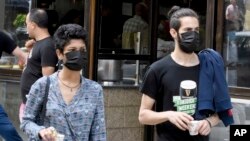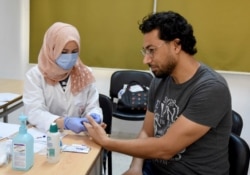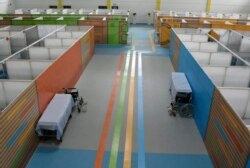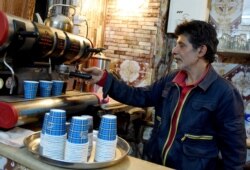Over nearly a decade since its revolution, Tunisia has weathered rollercoaster politics, a tanking economy, terrorism, populism and growing voter disaffection. Now, COVID-19.
So far, the coronavirus has left only a light footprint on the North African country, which is beginning to emerge from weeks of lockdown. But the pandemic underscores ongoing challenges it faces on its rocky road to democracy—which, analysts say, risk intensifying in the months to come.
“We overcame COVID as a health crisis,” said Salma Houerbi, a Tunis-based researcher for the Business & Human Rights Resource Center, an international non-governmental organization. “But now, we’re going to enter a very difficult economic period.”
With slightly more than 1,000 cases and fewer than 50 deaths reported, according to the Johns Hopkins University Coronavirus Resource Center, Tunisia counts among the lowest caseloads in the Arab region. Analysts partly credit the new government’s swift and proactive response for keeping the numbers down.
It amounts to an early victory for Prime Minister Elyes Fakhfakh and his cabinet, sworn into office in late February, less than a week before Tunisia's first cases were reported. Just across the Mediterranean, the pandemic was beginning to seriously spread across Europe, a key market for Tunisian tourism and exports.
Hard year ahead
Mindful of the country’s limited supply of ventilators and intensive care beds, authorities imposed a dawn-to-dusk curfew and a lockdown that shuttered businesses and schools. Tunisia’s fractious parliament also granted the prime minister temporary, exceptional powers to fight the pandemic.
Today, restrictions are unwinding. Hotels, restaurants and mosques are to reopen next week, after being shuttered for more than two months.
“All the indicators and data confirm that our approach to the virus was a success,” Fakhfakh told local TV in a recent interview, also crediting the country’s “scientific competencies” for keeping the caseload low.
“They did well, because they anticipated — medical facilities had limited capacity and they were afraid,” said Hamadi Redissi, president of the Tunisian Observatory for Democratic Transition research group, of the government.
“But now, they don’t have enough money to compensate the effects of COVID-19,” he added. “And that’s the problem.”
The International Monetary Fund predicts Tunisia’s economy will shrink 4.3 percent this year, its sharpest contraction in more than 60 years. Exports and the country’s all-important tourism sector have already fallen sharply, and the country shed more than 400,000 jobs during the lockdown. Some analysts predict already high unemployment will rise further, affecting up to a quarter of the population.
In recent weeks, Tunisia has received more than $1.5 billion in foreign aid from donors including the European Union and International Monetary Fund. Still, the sum only partly meets the more than $5 billion in external funding—double previous estimates—Prime Minister Fakhfakh says is needed this year.
“The economic impact is very deep,” said analyst Redissi. “It affects the whole spectrum. From companies forced to close, to people without steady jobs or resources.”
Meanwhile, a recent shortage in the staple couscous semolina sparked allegations of corruption and cronyism, stubborn holdovers of pre-revolution days, despite longstanding state promises to fight them.
Valuable time lost
Indeed, post-COVID-19 Tunisia arguably is in worse shape than a decade ago, when high unemployment helped trigger the 2011 revolution. The country has since been buffeted by political and economic instability across successive coalition governments.
Last year’s elections, ousting major, mainstream candidates, were particularly tumultuous. The presidential runoff in October pitted two populists and political novices against each other, with law expert Kais Saied winning handily.
Meanwhile, the legislative vote the same month ushered in a maze of political parties, creating a highly fractured parliament. It took four months before lawmakers finally approved a new government under Fakhfakh, after a previous candidate failed to pass a confidence vote.
“Tunisia has lost valuable time,” the International Crisis Group wrote in an early March report, calling for political dialogue and consensus-building. “The focus on national sovereignty among the new political forces threatens to stir up increasing populism, political tensions and social polarization. This will make it harder for the country to tackle its economic and security problems.”
Instead, the health crisis has only deepened them.
So far, Fakhfakh has announced some short-term support to small businesses and the poor. But he has yet to present a broader and detailed post-COVID-19 recovery strategy, although he says that will happen by the end of June.
“There are a few quick fixes the government should do as soon as possible,” researcher Houerbi said, including detailing plans to fight poverty and corruption.
She also believes this is the time for the government to sit down with unions and other civil society members and devise a socially oriented economic strategy that includes worker protections.
But, Houerbi added, “I’m worried there will be a lot of efforts to settle political scores, forgetting what is essential.”
Political tensions
There have been mounting tensions in recent weeks between President Saied and parliament speaker Rached Ghannouchi, according to analysts and media reports. The longtime leader of the moderate Islamist Ennahdha party, Ghannouchi appears to be encroaching on foreign policy issues—traditionally the president’s domain.
Critics point to his meeting earlier this year in Istanbul with Turkish President Recep Tayyip Erdogan. More recently, Ghannouchi stirred more controversy by congratulating Libyan Prime Minister Fayez al-Sarraj over a military success—countering Tunisia’s longtime neutral stance on the neighboring conflict.
“Today, there’s a political confrontation between the president of the republic and the president of parliament, with the prime minister in the middle,” said Tunisian journalist Tarek Mami, the Paris-based head of the France Maghreb 2 media website.
For his part, Saied has also drawn criticism for perceived missteps, although some blame it partly on bad communication.
“He’s a president who talks but doesn’t act, and increasingly, it’s in the form of moral discourses,” Mami said, echoing similar assessments by other analysts.
In the short term, some observers predict an uptick in public protests, as austerity takes hold. But not another revolution.
“People don’t want more democracy,” Houerbi said. “They want to eat.”







